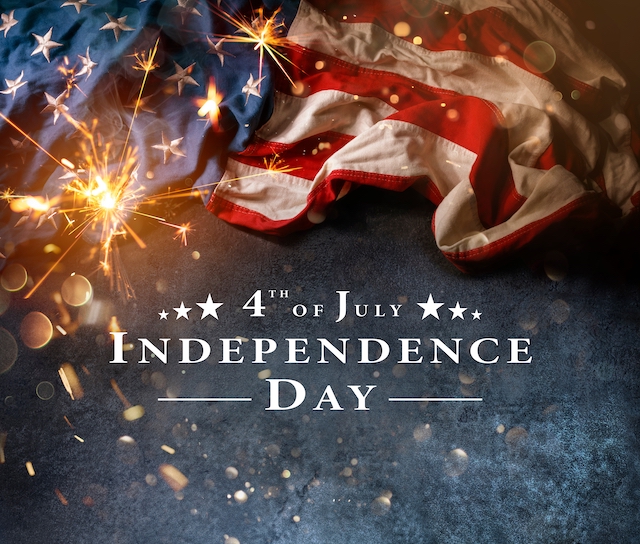As we celebrate Independence Day, it is critical to reflect on the state of our democracy and how recent Supreme Court decisions are reshaping our nation’s terrain.
Highlights:
– Independence Day commemorates the adoption of the Declaration of Independence, symbolizing freedom and democracy.
– Recent Supreme Court decisions significantly impact abortion rights, affirmative action, religious liberty, voting rights, environmental regulations, Chevron deference, and presidential immunity.
– The rulings shed light on ongoing tensions in American democracy, emphasizing the need for citizen engagement and vigilance.
– Voting in the upcoming presidential election is crucial for shaping the future of American democracy.
Independence Day commemorates the adoption of the Declaration of Independence on July 4, 1776, when the thirteen American colonies broke free from British rule. It is a day to celebrate liberty, democracy, and the pursuit of happiness. Traditionally marked by fireworks, parades, and patriotic displays, this holiday also serves as a reminder of the ongoing journey toward achieving a more perfect union.
Supreme Court Decisions and Their Impact
The latest session of the U.S. Supreme Court has seen several landmark decisions that profoundly impact the nation’s legal and social landscape. These rulings highlight the evolving interpretation of the Constitution and raise critical questions about the future of American democracy.
Abortion Rights
In a controversial decision, the Supreme Court upheld a Mississippi law banning most abortions after 15 weeks, effectively overturning Roe v. Wade. This landmark ruling has led to the immediate enforcement of “trigger laws” in multiple states, severely restricting access to abortion and sparking widespread protests and legal challenges. This decision draws attention to the ongoing struggle over reproductive rights and its implications for women’s autonomy and health care access.
Affirmative Action
The Court’s decision to strike down race-conscious admissions policies in higher education marks a significant shift in the landscape of affirmative action. This ruling, delivered by a 6-3 majority, ends decades of precedent allowing colleges and universities to consider race as a factor in admissions to promote diversity. The impact of this ruling will be felt across the educational sector, potentially reducing diversity in higher education institutions and sparking new debates about equality and access.
Religious Liberty and LGBTQ+ Rights
The ruling in 303 Creative v. Elenis, where the Court backed a web designer who refused to create wedding websites for same-sex couples on religious grounds, is another pivotal decision. This ruling raises concerns about the balance between religious liberty and anti-discrimination protections for LGBTQ+ individuals. It illustrates a broader trend of the Court favoring religious freedom claims, which could lead to more instances where individuals and businesses seek exemptions from anti-discrimination laws based on religious beliefs.
Voting Rights
In a surprising move, the Court ruled in favor of Black voters in Alabama, rejecting a Republican-led effort to weaken a landmark voting rights law. This decision requires Alabama to redraw its congressional districts to give Black voters more power, demonstrating the Court’s occasional willingness to uphold protections for minority voting rights despite its conservative majority.
Chevron Deference
Chevron deference was a legal doctrine that compelled courts to defer to a federal agency’s interpretation of an ambiguous statute that the agency administered, as long as the interpretation was reasonable. Established by the Supreme Court’s decision in Chevron U.S.A., Inc. v. Natural Resources Defense Council, Inc. (1984), this principle recognized the expertise of administrative agencies in interpreting and implementing complex regulations. The doctrine aimed to ensure that agencies, rather than courts, had the primary responsibility for policymaking in areas requiring specialized knowledge.
In a recent ruling, the Supreme Court significantly limited this deference, effectively overturning the broad application of Chevron deference. This change has sparked several criticisms and concerns:
1. Regulatory Clarity:
– Criticism: Congress must now provide clearer legislative mandates, potentially slowing regulatory processes and causing legislative gridlock.
– Concern: This places a greater burden on Congress to address technical issues that agencies are better equipped to handle.
2. Impact on Environmental Protection:
– Criticism: The EPA’s ability to regulate carbon emissions is restricted, weakening environmental protections and creating fragmented climate policies.
– Concern: This could result in weaker environmental protections and fragmented climate policies across states.
3. Public Health:
– Criticism: The ruling affects the FDA and CDC’s ability to enforce regulations related to public health, such as drug approvals and disease control.
– Concern: This could slow down drug and vaccine approvals and complicate public health initiatives during emergencies like pandemics.
4. Administrative Flexibility:
– Criticism: Reduces the ability of federal agencies to adapt regulations based on new information, hindering their effectiveness.
– Concern: This could hinder agencies like the Department of Labor and the Department of Education from updating safety standards and policies.
5. Judicial Overreach:
– Criticism: The ruling increases judicial overreach by allowing courts to decide on complex technical issues best left to specialized agencies.
– Concern: This could lead to inconsistent judicial interpretations and undermine regulatory predictability and stability.
6. Economic Impacts:
– Criticism: Businesses may face increased uncertainty and litigation costs as courts, rather than agencies, interpret ambiguous statutes.
– Concern: This uncertainty could create a less favorable environment for investment and innovation, affecting healthcare, environmental services, and technology sectors.
Presidential Immunity
In a historic decision, the Supreme Court ruled on Trump v. United States, addressing presidential immunity. The Court decided that while former presidents do not have absolute immunity from criminal charges for their unofficial acts, their official acts have total immunity from criminal prosecution. This decision has significant implications for presidential accountability and the balance of power in the executive branch.
1. Potential for a Loophole in Accountability:
– Critics argue that the ruling could create a loophole where certain presidential actions are shielded from prosecution. This could allow former presidents to evade accountability for serious misconduct deemed part of their constitutional duties, undermining the principle that no one is above the law.
2. Judicial Overreach:
– Some critics believe that the ruling increases judicial overreach by allowing courts to decide on matters that might be better handled by specialized agencies or political processes. This could lead to inconsistent judicial interpretations and potential biases.
3. Impact on Separation of Powers:
– Concerns have been raised that the decision might upset the balance of power among the executive, legislative, and judicial branches. By allowing certain presidential actions to be protected, it could weaken the judiciary’s ability to check executive power effectively.
4. Future Presidential Conduct:
– There is worry that future presidents may exploit this ruling to engage in questionable activities, knowing they might claim constitutional protection for their actions. This could encourage misuse of presidential powers and erode public trust in the executive branch.
5. Legal and Political Ramifications:
– The ruling could lead to prolonged legal battles as lower courts interpret what constitutes official versus private conduct. Politically, it might influence public perception of presidential immunity and prompt calls for legislative changes to clarify the boundaries of executive privilege.
The Broader Context
These judgments come at a time when American democracy faces multiple challenges. The increasing polarization of the Supreme Court, coupled with ethical controversies surrounding some justices, adds to the perception of a judiciary that is deeply divided and politically influenced. As we think about Independence Day, it is essential to recognize that the principles of liberty, justice, and equality remain central to the American endeavor, but their interpretation and application are continuously evolving.
The Importance of Voting in the Upcoming Presidential Election
As we look forward to the next presidential election, the importance of voting cannot be overstated. The outcomes of recent Supreme Court decisions demonstrate how significantly judicial interpretations can shape the nation’s future. Voting is a powerful way to influence the direction of the country, ensuring that elected officials and appointed judges reflect the values and priorities of the public. Engaging in the electoral process is crucial for upholding democracy and advocating for policies that promote justice, equality, and freedom for all.
Personal Stories: Voices of Impact
Consider the story of Maria, a young woman in Texas, who found herself affected by the state’s stringent abortion laws after the overturning of Roe v. Wade. Facing a challenging decision, Maria’s access to necessary health services was severely restricted, highlighting the real-world implications of judicial decisions on individual lives. Similarly, ponder James, a Black voter in Alabama who feels a renewed sense of hope and empowerment after the Supreme Court’s decision to protect voting rights in his state, ensuring his voice is heard in future elections.
A Call to Reflect and Engage
Independence Day is not just a celebration of the past but a call to engage with the present and shape the future. The recent Supreme Court decisions remind us that the fight for democracy and justice is ongoing. As citizens, it is our duty to stay informed, participate in the democratic process, and advocate for a society that upholds the values enshrined in the Declaration of Independence.
Closing Remarks
This Independence Day, let us contemplate state of our democracy and the challenges ahead. Let us honor the spirit of the holiday by recommitting to the principles of freedom, equality, and justice for all. And let us remember that the pursuit of a more perfect union is a continuous journey that requires vigilance, courage, and collective action.
Take this moment to:
– Participate in the upcoming presidential election to shape the future of our nation.
– Educate yourself about the issues at stake and the recent Supreme Court decisions that impact our daily lives.
– Get involved with local or national advocacy groups fighting for justice and equality.
Engage with these issues and make your voice heard. Together, we can uphold the values enshrined in the Declaration of Independence and ensure a brighter future for all.


